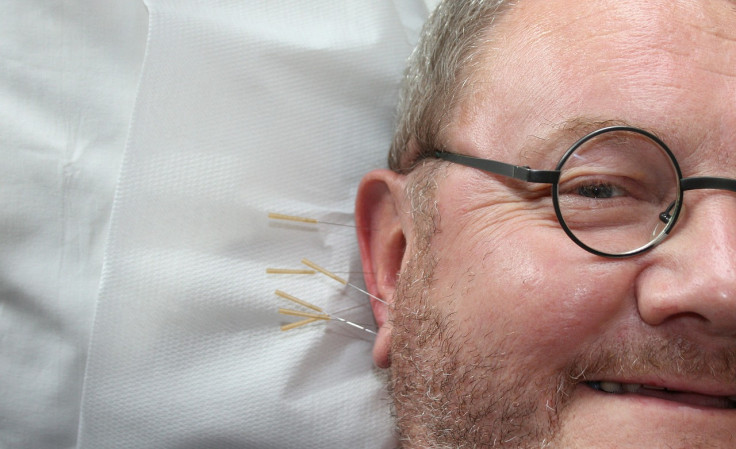Acudetox: People are inserting needles into their ears to treat addiction - but does it work?
The treatment - known as acudetox - has been shown to reduce opioid cravings in addicted rats.

The art of acupuncture derived from ancient Chinese medicine. Today, whilst it is widely used, it is commonly thought to have little evidence to prove its effectiveness.
In an attempt to treat an opioid addiction which stemmed from the pain induced by a car crash six years earlier, Andres Demoya found himself in a clinic with needles in his ears.
Demoya was being treated for his addiction with acudetox- a method of inserting five needles in specific points within his ears. Otherwise known as Nada (National Acupuncture Detoxification Association) protocol or auricular acupuncture, and is a treatment occasionally used in addiction treatment clinics.
It is well documented that opioid withdrawal is an extremely trying experience - with symptoms including agitation, cravings, nausea, depression and anxiety - but Demoya said that after his first session with the pins his pain and concentration had improved, Tonic reported.
The vital difference between acudetox and traditional acupuncture, where practitioners personalise the placement of dozens of needles in various points across the body, is that it uses just five needles placed in specific spots within the ear.
"In our 2012 report, Addiction Medicine: Closing the Gap between Science and Practice, we described acupuncture as one of several types of alternative/complementary interventions used in addiction treatment," Linda Richter, Director of Policy Research and Analysis at The National Centre on Addiction and Substance Abuse told IBTimes UK. "Traditionally, it has been used primarily for cocaine addiction."
Having started out in 1974, staff at South Bronx's Lincoln Recovery Center spent 10 years developing the basic five ear-points Nada protocol for the treatment of addiction.
Much more recently, in 1997, the National Institutes of Health issued a consensus statement naming addiction as one of the methods where acupuncture seemed to be a valuable addition to comprehensive treatment programmes. In addition, a 2016 study in mice showed that a Nada intervention reduced opioid cravings in addicted rodents.
Is there a 'cure' for addiction? If yes, could acudetox be the answer?
Despite its increasing use, Richter told IBTimes UK that there was little evidence to prove its success in treating addiction.
"The US' National Institutes of Health's consensus statement on the topic concludes that research on the effectiveness of this practice is limited and most of the studies are not well done; however, there are some indications that it might be helpful to some people as an adjunct to evidence-based addiction treatment."
She reiterates that it is important to note there are other treatments available for addiction that have been proven to work, including counselling and therapy along with numerous FDA-approved medications.
Other treatments such as acudetox could support these well-known treatments but she recommends not making them the priority over the proven ways of tackling it.
As for being the "cure to addiction", she said addiction was not as simple as that.
"Unfortunately, we don't yet have 'an addiction cure' so anything touted as such is misleading. Addiction is a very complex disease and, although there are interventions and treatments that can reduce the symptoms and help people lead normal healthy lives, in many cases addiction is chronic and relapsing, much like diabetes, asthma, and other chronic health conditions.
"We would never discourage people from learning about interventions that can be helpful for managing symptoms and helping them stay in treatment and reduce the risk of relapse. The danger would be if acupuncture is promoted in place of those treatments that have been proven to work."
How should addiction be treated?
"Just like any other health condition, the best way to treat and manage addiction is through the health care system rather than a system in which individuals with no health care training are providing the treatments."
When it comes to treating the patient she said "the health care provider should conduct a comprehensive assessment of the extent and severity of the symptoms, determine a clinical diagnosis, evaluate co-occurring health conditions, and develop a tailored treatment plan".
"The disease must be managed by health care professionals over time. The recovery process can be aided by support services such as 12-step programs.
Ultimately, she said that the findings and the feedback on acudetox seems promising but the next step was to create effective trials. Only until then, can the true effects of the procedure on addiction be really understood.






